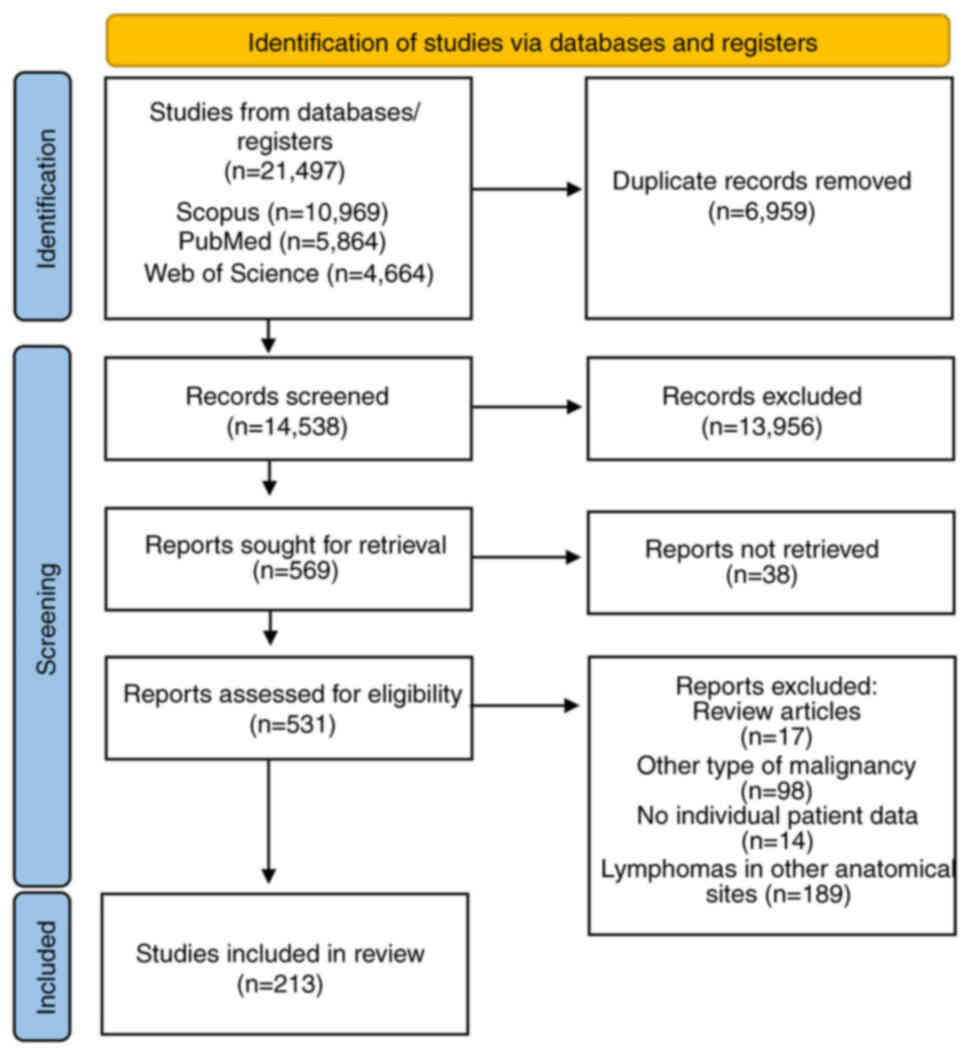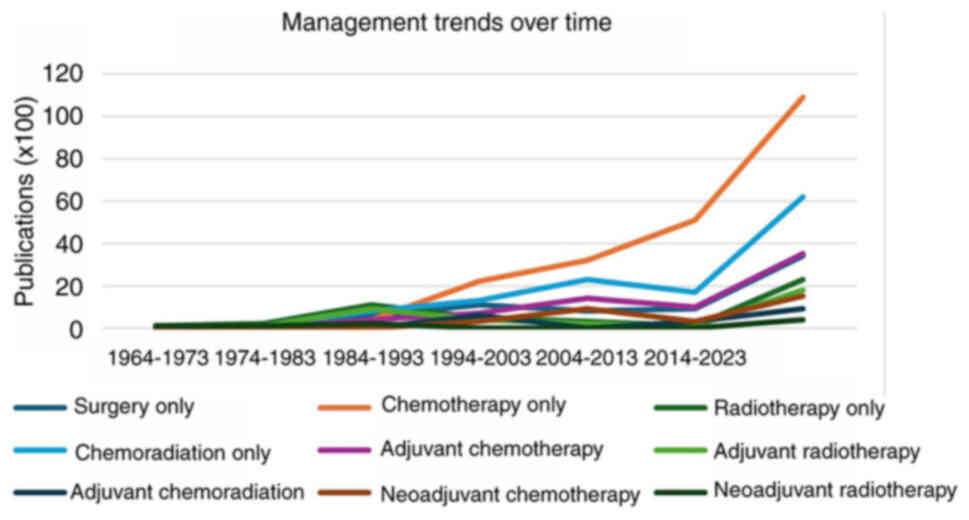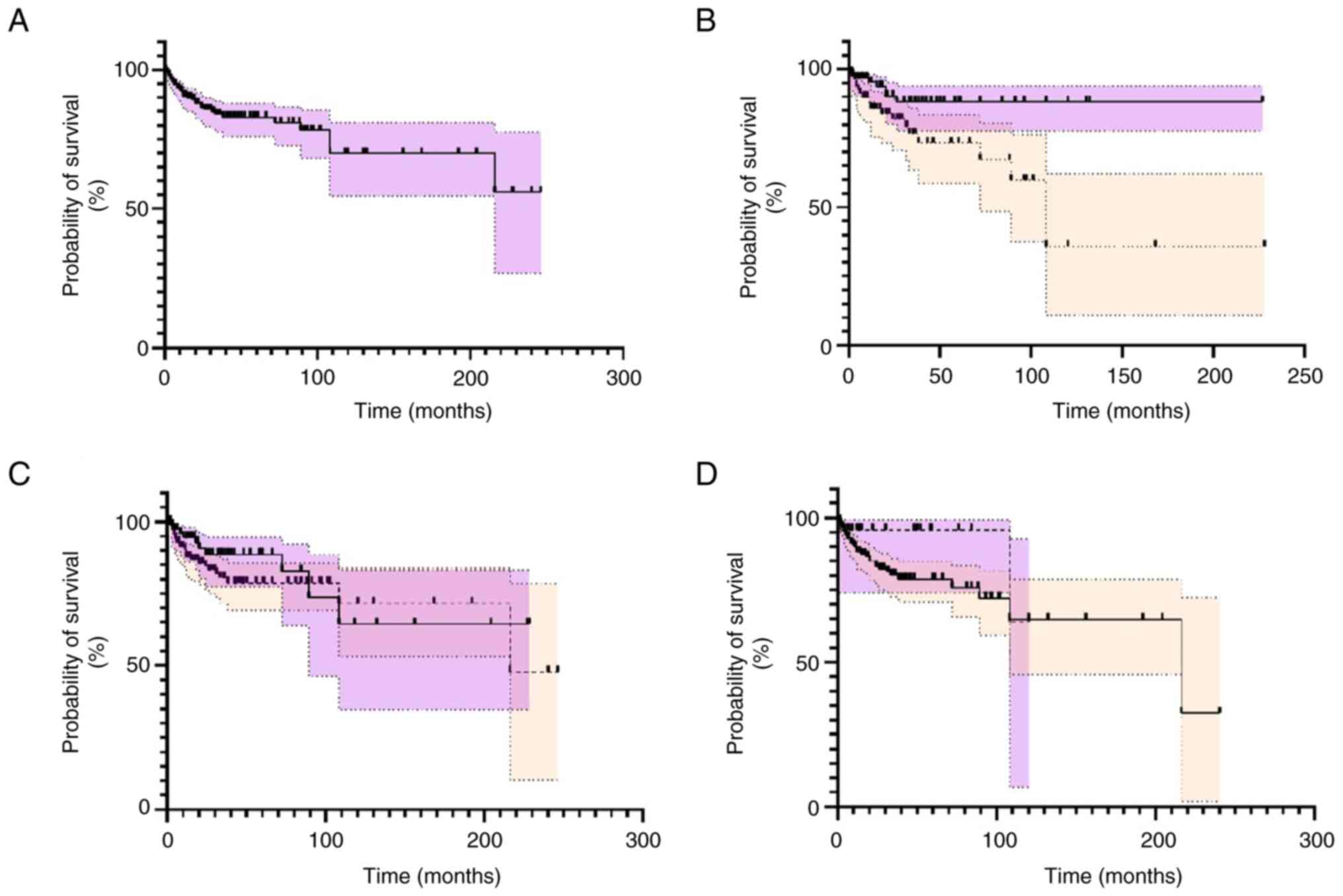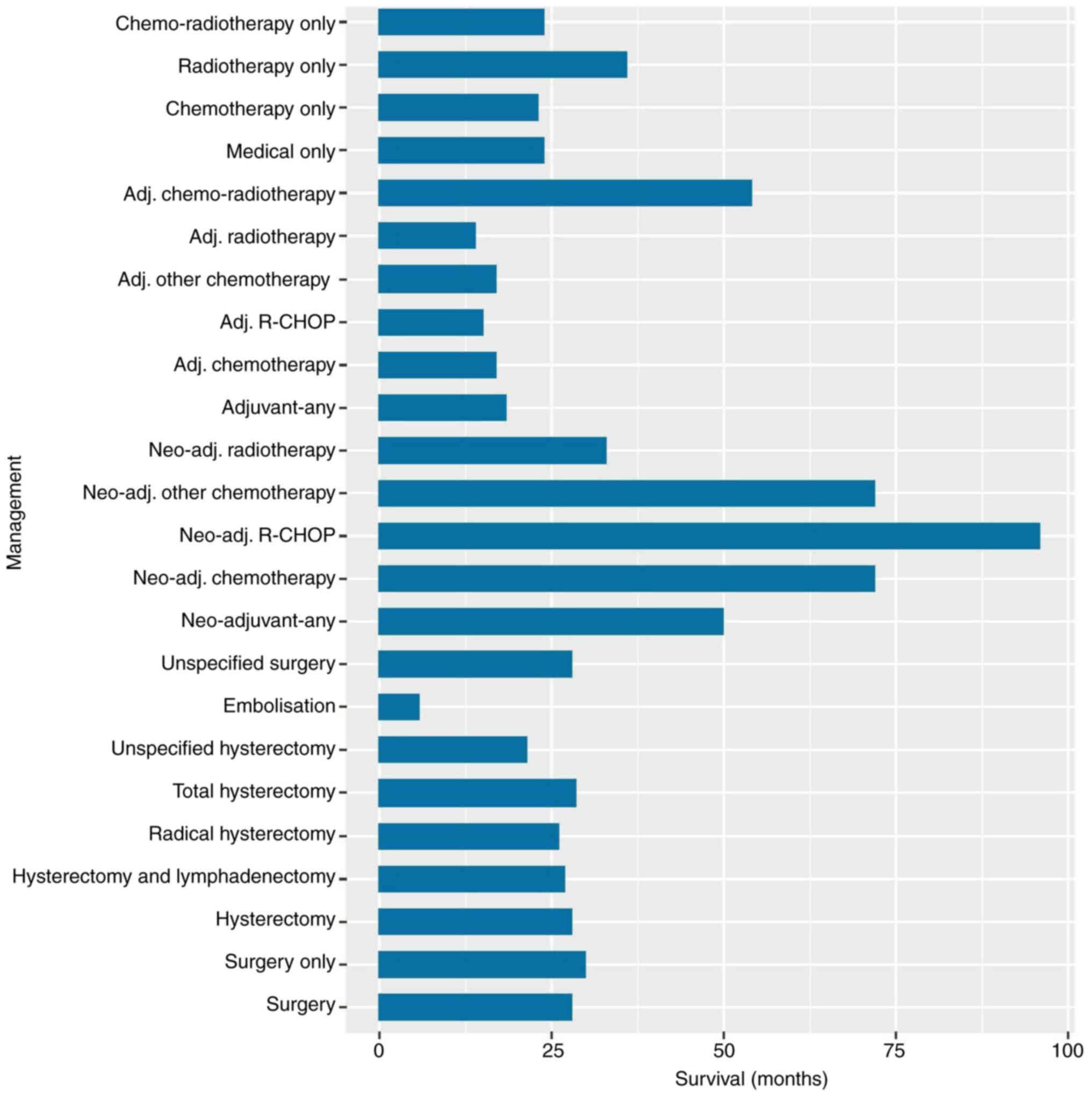|
1
|
Matasar MJ and Zelenetz AD: Overview of
lymphoma diagnosis and management. Radiol Clin North Am.
46:175–198. 2008. View Article : Google Scholar : PubMed/NCBI
|
|
2
|
Paquin AR, Oyogoa E, McMurry HS, Kartika
T, West M and Shatzel JJ: The diagnosis and management of suspected
lymphoma in general practice. Eur J Haematol. 110:3–13. 2023.
View Article : Google Scholar : PubMed/NCBI
|
|
3
|
Freeman C, Berg JW and Cutler SJ:
Occurrence and prognosis of extranodal lymphomas. Cancer.
29:252–260. 1972. View Article : Google Scholar : PubMed/NCBI
|
|
4
|
Chan JK, Loizzi V, Magistris A, Hunter MI,
Rutgers J, DiSaia PJ and Berman ML: Clinicopathologic features of
six cases of primary cervical lymphoma. Am J Obstet Gynecol.
193:866–872. 2005. View Article : Google Scholar : PubMed/NCBI
|
|
5
|
Harris NL and Scully RE: Malignant
lymphoma and granulocytic sarcoma of the uterus and vagina: A
clinicopathologic analysis of 27 cases. Cancer. 53:2530–2545. 1984.
View Article : Google Scholar : PubMed/NCBI
|
|
6
|
Shen H, Wei Z, Zhou D, Zhang Y, Han X,
Wang W, Zhang L, Yang C and Feng J: Primary extranodal diffuse
large B-cell lymphoma: A prognostic analysis of 141 patients. Oncol
Lett. 16:1602–1614. 2018.PubMed/NCBI
|
|
7
|
Hilal Z, Hartmann F, Dogan A, Cetin C,
Krentel H, Schiermeier S, Schultheis B and Tempfer CB: Lymphoma of
the cervix: Case report and review of the literature. Anticancer
Res. 36:4931–4940. 2016. View Article : Google Scholar : PubMed/NCBI
|
|
8
|
Shamseer L, Moher D, Clarke M, Ghersi D,
Liberati A, Petticrew M, Shekelle P and Stewart LA; PRISMA-P Group,
: Preferred reporting items for systematic review and meta-analysis
protocols (PRISMA-P) 2015: Elaboration and explanation. BMJ.
349:g76472015. View Article : Google Scholar : PubMed/NCBI
|
|
9
|
del Valle-Rubido C, Cano-Cuetos A,
Heras-Sedano I, Marcos-González V, Marcos-González M and
Marcos-González A: Linfoma primario de cérvix: Gestación tras
tratamiento conservador Primary lymphoma of the cervix: Pregnancy
after conservative treatment. Progresos de Obstetricia y
Ginecología. 57:225–229. 2014.(In Spanish). View Article : Google Scholar
|
|
10
|
Plewicka M, Szelc S, Smok-Ragankiewicz A,
Wojcieszek A and Szkita D: Non-Hodgkin's lymphoma of the uterine
cervix. Ginekol Pol. 66:246–248. 1995.(In Polish). PubMed/NCBI
|
|
11
|
Makarewicz R, Swirska M and Terlikiewicz
J: Non-hodgkin's malignant lymphoma in the uterine cervix. Wiad
Lek. 46:936–937. 1993.(In Polish). PubMed/NCBI
|
|
12
|
Hashimoto A, Fujimi A, Kanisawa Y, Matsuno
T, Okuda T, Minami S, Doi T, Ishikawa K, Uemura N, Jyomen and
Tomaru U: Primary diffuse large B-cell lymphoma of the uterine
cervix successfully treated with rituximabplus cyclophosphamide,
doxorubicin, vincristine, and prednisone chemotherapy-a case
report. Gan To Kagaku Ryoho. 40:2589–2592. 2013.(In Japanese).
PubMed/NCBI
|
|
13
|
Isosaka M, Hayashi T, Mitsuhashi K, Tanaka
M, Adachi T, Kondo Y, Suzuki T and Shinomura Y: Primary diffuse
large B-cell lymphoma of the uterus complicated with
hydronephrosis. Rinsho Ketsueki. 54:392–396. 2013.(In Japanese).
PubMed/NCBI
|
|
14
|
Murotsuki J, Yazaki S, Hayakawa S and
Yamashita T: A case of malignant lymphoma of the uterine cervix.
Gan No Rinsho. 35:1716–1720. 1989.(In Japanese). PubMed/NCBI
|
|
15
|
Ohkuma Y, Hachisuga T, Fukuda K and
Sugimori H: 23 Examination of lymphoma-like lesion of the uterine
cervix. Journal of the Japanese Society of Obstetrics and
Gynecology. 43:11331991.(In Japanese).
|
|
16
|
Joanna Briggs Institute, . Checklist for
Case Reports Critical Appraisal tools for use in JBI Systematic
Reviews. Joanna Briggs Institute; Adelaide, Australia: 2019,
https://jbi.global/sites/default/files/2021-10/Checklist_for_Case_Reports.docxFebruary
15–2024
|
|
17
|
Woodruff J, Castillo RN and Novak E:
Lymphoma of the ovary. A study of 35 cases from the ovarian tumor
registry of the American gynecological society. Am J Obstet
Gynecol. 85:912–918. 1963. View Article : Google Scholar : PubMed/NCBI
|
|
18
|
Paladugu RR, Bearman RM and Rappaport H:
Malignant lymphoma with primary manifestation in the gonad: A
clinicopathologic study of 38 patients. Cancer. 45:561–571. 1980.
View Article : Google Scholar : PubMed/NCBI
|
|
19
|
Dursun P, Gultekin M, Bozdag G, Usubutun
A, Uner A, Celik NY, Yuce K and Ayhan A: Primary cervical lymphoma:
Report of two cases and review of the literature. Gynecol Oncol.
98:484–489. 2005. View Article : Google Scholar : PubMed/NCBI
|
|
20
|
Trenhaile TR and Killackey MA: Primary
pelvic non-Hodgkin's lymphoma. Obstet Gynecol. 97:717–720. 2001.
View Article : Google Scholar : PubMed/NCBI
|
|
21
|
Chorlton I, Norris H and King F: Malignant
reticuloendothelial disease involving the ovary as a primary
manifestation. A series of 19 lymphomas and 1 granulocytic sarcoma.
Cancer. 34:397–407. 1974. View Article : Google Scholar : PubMed/NCBI
|
|
22
|
Van de Rijn M, Kamel OW, Chang PP, Lee A,
Warnke RA and Salhany KE: Primary low-grade endometrial B-cell
lymphoma. Am J Surg Pathol. 21:187–194. 1997. View Article : Google Scholar : PubMed/NCBI
|
|
23
|
Stroh EL, Besa PC, Cox JD, Fuller LM and
Cabanillas FF: Treatment of patients with lymphomas of the uterus
or cervix with combination chemotherapy and radiation therapy.
Cancer. 75:2392–2399. 1995. View Article : Google Scholar : PubMed/NCBI
|
|
24
|
Fox H and More J: Primary malignant
lymphoma of the uterus. J Clin Pathol. 18:723–728. 1965. View Article : Google Scholar : PubMed/NCBI
|
|
25
|
Monterroso V, Jaffe ES, Merino MJ and
Medeiros LJ: Malignant lymphomas involving the ovary: A
clinicopathologic analysis of 39 cases. Am J Surg Pathol.
17:154–1570. 1993. View Article : Google Scholar : PubMed/NCBI
|
|
26
|
Swerdlow SH, Campo E, Harris NL, Jaffe ES,
Pileri SA, Stein H and Thiele J: WHO Classification of Tumours of
Haematopoietic and Lymphoid Tissues. International Agency for
Research on Cancer. 2016.
|
|
27
|
Morton LM, Wang SS, Devesa SS, Hartge P,
Weisenburger DD and Linet MS: Lymphoma incidence patterns by WHO
subtype in the United States, 1992–2001. Blood. 107:265–276. 2006.
View Article : Google Scholar : PubMed/NCBI
|
|
28
|
Kosari F, Daneshbod Y, Parwaresch R, Krams
M and Wacker HH: Lymphomas of the female genital tract: A study of
186 cases and review of the literature. Am J Surg Pathol.
29:1512–1520. 2005. View Article : Google Scholar : PubMed/NCBI
|
|
29
|
Pretorius R, Semrad N, Watring W and
Fotheringham N: Presentation of cervical cancer. Gynecol Oncol.
42:48–53. 1991. View Article : Google Scholar : PubMed/NCBI
|
|
30
|
Kechagias KS, Zafeiri M, Katsikas
Triantafyllidis K, Kyrtsonis G, Geropoulos G, Lyons D, Burney Ellis
L, Bowden S, Galani A, Paraskevaidi M and Kyrgiou M: Primary
melanoma of the cervix uteri: A systematic review and meta-analysis
of the reported cases. Biology. 12:3982023. View Article : Google Scholar : PubMed/NCBI
|
|
31
|
Stabile G, Ripepi C, Sancin L, Restaino S,
Mangino FP, Nappi L and Ricci G: Management of primary uterine
cervix B-cell lymphoma stage IE and fertility-sparing outcome: A
systematic review of the literature. Cancers (Basel). 15:36792023.
View Article : Google Scholar : PubMed/NCBI
|
|
32
|
Intaraphet S, Farkas DK, Johannesdottir
Schmidt SA, Cronin-Fenton D and Søgaard M: Human papillomavirus
infection and lymphoma incidence using cervical conization as a
surrogate marker: A Danish nationwide cohort study. Hematol Oncol.
35:172–176. 2017. View Article : Google Scholar : PubMed/NCBI
|
|
33
|
Kyrgiou M, Bowden S, Athanasiou A,
Paraskevaidi M, Kechagias K, Zikopoulos A, Terzidou V,
Martin-Hirsch P, Arbyn M, Bennett P and Paraskevaidis E: Morbidity
after local excision of the transformation zone for cervical
intra-epithelial neoplasia and early cervical cancer. Best Pract
Res Clin Obstet Gynaecol. 75:10–22. 2021. View Article : Google Scholar : PubMed/NCBI
|
|
34
|
Kechagias KS, Kalliala I, Bowden SJ,
Athanasiou A, Paraskevaidi M, Paraskevaidis E, Dillner J, Nieminen
P, Strander B, Sasieni P, et al: Role of human papillomavirus (HPV)
vaccination on HPV infection and recurrence of HPV-related disease
after local surgical treatment: Aystematic review and
meta-analysis. BMJ. 378:e0701352022. View Article : Google Scholar : PubMed/NCBI
|
|
35
|
Kechagias KS, Giannos P, Bowden S,
Tabassum N, Paraskevaidi M and Kyrgiou M: PCNA in cervical
intraepithelial neoplasia and cervical cancer: An interaction
network analysis of differentially expressed genes. Front Oncol.
11:7790422021. View Article : Google Scholar : PubMed/NCBI
|
|
36
|
Bowden SJ, Doulgeraki T, Bouras E,
Markozannes G, Athanasiou A, Grout-Smith H, Kechagias KS, Ellis LB,
Zuber V, Chadeau-Hyam M, et al: Risk factors for human
papillomavirus infection, cervical intraepithelial neoplasia and
cervical cancer: An umbrella review and follow-up Mendelian
randomisation studies. BMC Med. 21:2742023. View Article : Google Scholar : PubMed/NCBI
|
|
37
|
Cho J: Basic immunohistochemistry for
lymphoma diagnosis. Blood Res. 57:55–61. 2022. View Article : Google Scholar : PubMed/NCBI
|
|
38
|
Eichenauer DA, Aleman BM, André M,
Federico M, Hutchings M, Illidge T, Engert A and Ladetto M; ESMO
Guidelines Committee, : Hodgkin lymphoma: ESMO clinical practice
guidelines for diagnosis, treatment and follow-up. Ann Oncol. 29
(Suppl 4):iv19–iv29. 2018. View Article : Google Scholar : PubMed/NCBI
|
|
39
|
Campo E, Swerdlow SH, Harris NL, Pileri S,
Stein H and Jaffe ES: The 2008 WHO classification of lymphoid
neoplasms and beyond: Evolving concepts and practical applications.
Blood. 117:5019–5032. 2011. View Article : Google Scholar : PubMed/NCBI
|
|
40
|
Chaganti S, Illidge T, Barrington S, Mckay
P, Linton K, Cwynarski K, McMillan A, Davies A, Stern S and Peggs
K; British Committee for Standards in Haematology, : Guidelines for
the management of diffuse large B-cell lymphoma. Br J Haematol.
174:43–56. 2016. View Article : Google Scholar : PubMed/NCBI
|
|
41
|
Cibula D, Raspollini MR, Planchamp F,
Centeno C, Chargari C, Felix A, Fischerová D, Jahnn-Kuch D, Joly F,
Kohler C, et al: ESGO/ESTRO/ESP guidelines for the management of
patients with cervical cancer-Update 2023. Virchows Arch.
482:935–966. 2023. View Article : Google Scholar : PubMed/NCBI
|
|
42
|
National Institute for Health and Care
Excellence, . Non-Hodgkin lymphoma. Updated guidelines.
2023.https://www.nice.org.uk/guidance/ng52/resources/nonhodgkin-lymphoma-pdf-3306777546949March
8–2024
|
|
43
|
Frieden TR: Evidence for health decision
making-beyond randomized, controlled trials. N Engl J Med.
377:465–475. 2017. View Article : Google Scholar : PubMed/NCBI
|
|
44
|
Board PATE: Non-Hodgkin Lymphoma Treatment
(PDQ®). PDQ Cancer Information Summaries. National
Cancer Institute; 2023
|
|
45
|
Friede T, Posch M, Zohar S, Alberti C,
Benda N, Comets E, Day S, Dmitrienko A, Graf A, Günhan BK, et al:
Recent advances in methodology for clinical trials in small
populations: The InSPiRe project. Orphanet J Rare Dis. 13:1862018.
View Article : Google Scholar : PubMed/NCBI
|
|
46
|
Lane PW: Meta-analysis of incidence of
rare events. Stat Methods Med Res. 22:117–1132. 2013. View Article : Google Scholar : PubMed/NCBI
|
|
47
|
Cai T, Parast L and Ryan L: Meta-analysis
for rare events. Stat Med. 29:2078–2089. 2010. View Article : Google Scholar : PubMed/NCBI
|


















